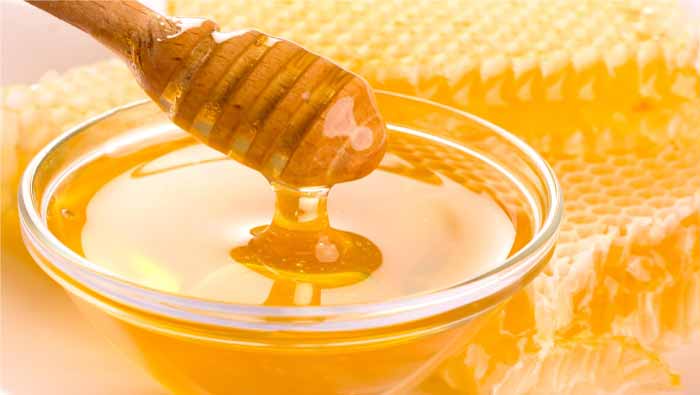Honey is a natural and healthy food that offers a number of health benefits.
It is important to note that honey is high in calories and natural sugars, so it should be consumed in moderation and as part of a balanced and healthy diet.
Some of the main benefits of honey include:
Antimicrobial properties
Honey has natural antimicrobial properties due to the presence of certain compounds such as hydrogen peroxide, gluconic acid, and malic acid, among others. These compounds have the ability to inhibit the growth and activity of certain bacteria, fungi, and viruses, making them a valuable tool in the prevention and treatment of infections.
Hydrogen peroxide is produced by bees when they add an enzyme called glucose oxidase to honey. This compound can kill a wide range of microorganisms, including bacteria, fungi, and viruses.
Gluconic acid and malic acid are produced during the natural fermentation process of honey. These acids create an acidic environment that inhibits the growth of harmful bacteria.
In addition, honey also contains flavonoids and other phenolic compounds that have antimicrobial and anti-inflammatory properties.
In short, honey is a natural and healthy food that offers unique and valuable antimicrobial properties that can help prevent and treat infections.
What microorganisms it repels
Honey has the ability to inhibit the growth and activity of a wide variety of microorganisms, including bacteria, fungi, and viruses. Some of the microorganisms that honey has been shown to repel or inhibit its growth are:
Bacteria: Staphylococcus aureus, Escherichia coli, Pseudomonas aeruginosa, Streptococcus pyogenes, Helicobacter pylori, Salmonella spp , and many others.
Fungi: Candida albicans, Aspergillus niger, Penicillium spp, and other pathogenic fungi.
Viruses: influenza virus, herpes simplex virus, human papillomavirus (HPV), West Nile virus, among others.
It is important to note that the effectiveness of honey against microorganisms can vary depending on the variety of honey, the concentration of antimicrobial compounds and other factors.
Cough and cold relief
Honey can be effective in relieving coughs and other cold symptoms due to its antimicrobial and anti-inflammatory properties.
Several studies have shown that honey is more effective than syrup-based cough medicines in relieving nighttime coughs and improving sleep in children. In addition, honey can also soothe throat irritation and reduce inflammation, which can help reduce other cold symptoms, such as nasal congestion and sneezing.
Honey can be consumed directly or added to a cup of tea or warm milk to relieve coughs and other cold symptoms. It is important to note that honey should not be given to infants under 1 year due to the risk of infant botulism. In addition, honey should not be considered as a single treatment for cold and other respiratory diseases, and it is important to follow medical recommendations to treat these symptoms.
Improves digestive health
Honey can be beneficial for digestive health due to its prebiotic, anti-inflammatory, and antimicrobial properties.
Prebiotics are substances that feed the beneficial bacteria in the gut, promoting their growth and improving digestive health. Honey contains oligosaccharides, a type of prebiotic that can help stimulate the growth of beneficial bacteria in the gut.
In addition, honey also has anti-inflammatory properties that can help reduce inflammation in the gut and relieve symptoms of inflammatory bowel disorders, such as Crohn’s disease and ulcerative colitis.
Honey also contains antimicrobial compounds that can help prevent and treat intestinal infections caused by harmful bacteria, such as salmonella and E. coli.
It is important to note that honey is rich in sugars and should be consumed in moderation. Also, people with diabetes should consult their doctor before consuming honey because of its sugar content.
Antioxidant properties
Honey has antioxidant properties due to the presence of phenolic compounds such as flavonoids, phenolic acids and lignans, which have the ability to neutralize free radicals and prevent cell damage.
Free radicals are unstable molecules that are formed in our body as a result of natural processes such as digestion, respiration, and metabolism, as well as external factors such as pollution and sun exposure. These free radicals can damage cells and contribute to aging, inflammation, and chronic diseases such as cancer, cardiovascular disease, and diabetes.
The antioxidant compounds in honey can help protect cells against free radical damage and prevent oxidative stress, which is a risk factor for various chronic diseases. In addition, honey has been shown to increase antioxidant levels in the blood and improve the body’s antioxidant capacity.
It should be noted that the antioxidant effects of honey can vary depending on the variety of honey and the concentration of antioxidant compounds present.
Helps improve sleep quality
Honey can help improve sleep quality due to its natural sugar content and anti-inflammatory and relaxing properties.
Consuming honey before bed can increase insulin levels in the body, which in turn increases the release of tryptophan in the brain. Tryptophan is an amino acid that is converted into serotonin, a neurotransmitter that promotes relaxation and sleep.
In addition, honey also contains antioxidants and anti-inflammatory compounds that can help reduce inflammation in the body and promote restful sleep. Chronic inflammation has been linked to sleep disorders such as sleep apnea and insomnia.
Honey can also help reduce the production of orexin, a neurotransmitter that is associated with wakefulness and alertness. By reducing orexin production, honey can help promote relaxation and drowsiness.
It is important to note that excessive sugar consumption can negatively affect the quality of sleep, so it is recommended to consume honey in moderation and as part of a healthy and balanced diet.
Honey helps improve skin health
It can be beneficial for skin health due to its antimicrobial, anti-inflammatory, moisturizing and antioxidant properties.
The antimicrobial properties can help fight bacteria and fungi that cause skin infections, such as acne, ulcers, and infected wounds. It can also help prevent infection in wounds and burns.
The anti-inflammatory properties can help reduce inflammation in the skin and relieve symptoms of inflammatory skin conditions, such as atopic dermatitis and psoriasis.
It is also a natural moisturizer that can help keep skin hydrated and soft. It can help retain moisture in the skin and prevent dryness, which is especially beneficial for people with dry skin.
In addition, honey is rich in antioxidants that can help protect the skin against free radical damage and prevent premature aging of the skin.
It is important to note that it can cause an allergic reaction in some people, so it is advisable to do an allergy test before using it on the skin. In addition, it is recommended to use a high-quality, unprocessed one to get the most benefits for the skin.
Honey is a source of natural energy
It is a natural energy source due to its content of simple sugars such as glucose and fructose, which are easily absorbed by the body and provide a quick source of energy.
Carbohydrates are a source of fuel for muscles, making it a popular choice for athletes and active people. It also contains small amounts of vitamins and minerals, such as vitamin C, calcium, and iron, which can help keep the body healthy and energetic.
Unlike processed and sugary foods, it also contains antioxidant and anti-inflammatory compounds that can help prevent oxidative stress and inflammation, which can contribute to better overall health and sustained energy levels.
However, it is important to note that it is also rich in calories and sugars, so it is recommended to consume it in moderation and as part of a balanced and healthy diet.
Honey is healing
It is known for its healing properties due to its ability to stimulate tissue regeneration and reduce inflammation in wounds and burns.
It is a natural antibacterial and antimicrobial agent that can help prevent infection in wounds. In addition, it also contains an enzyme called glucose oxidase, which slowly releases hydrogen peroxide when it comes into contact with the skin, which can also help prevent infection and stimulate healing.
It can also reduce inflammation in the skin, which can speed up wound healing. Anti-inflammatory compounds can reduce swelling and redness in the skin, which can improve the appearance of the scar after the wound has healed.
In addition, it is rich in antioxidants that can help protect the skin from free radicals and prevent cell damage that can delay wound healing.
It is important to note that not all honeys are the same in terms of healing properties, so it is recommended to use raw and unprocessed honey for the greatest benefits. In addition, it is important to clean the wound thoroughly before applying to prevent infection. If the wound is deep or does not heal properly, it is important to seek medical attention.


